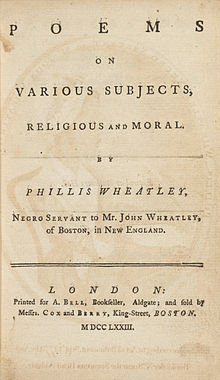The publication of her Poems on Various Subjects, Religious and Moral (1773) brought her fame both in England and the American colonies; figures such as George Washington praised her work. During Wheatley's visit to England with her master's son, the African-American poet Jupiter Hammon praised her work in his own poem.
At the age of eight, she was sold to the wealthy Boston merchant and tailor John Wheatley, who bought the young girl as a servant for his wife Susanna. John and Susanna Wheatley named the young girl Phillis, after the ship that had brought her to America. She was given their last name of Wheatley, as was a common custom if any surname was used for slaves.
The Wheatley’s eighteen-year-old daughter, Mary, first tutored Phillis in reading and writing. Their son Nathaniel also helped her. John Wheatley was known as a progressive throughout New England; his family gave Phillis an unprecedented education for an enslaved person, and for a female of any race. By the age of twelve, Phillis was reading Greek and Latin classics and difficult passages from the Bible. Recognizing her literary ability, the Wheatley family supported Phillis' education and left the household labor to their other domestic slaves. The Wheatleys often showed off Phillis' abilities to friends and family. Strongly influenced by her studies of the works of Alexander Pope, John Milton, Homer, Horace and Virgil, Phillis Wheatley began to write poetry.
Her poetry expressed Christian themes, and many poems were dedicated to famous figures. Over one-third consist of elegies, the remainder being on religious, classical, and abstract themes. She seldom referred to her own life in her poems. One example of a poem on slavery is "On being brought from Africa to America":
- Twas mercy brought me from my Pagan land,
Taught my benighted soul to understand
That there's a God, that there's a Saviour too:
Once I redemption neither sought nor knew.
Some view our sable race with scornful eye,
"Their colour is a diabolic dye."
Remember, Christians, Negroes, black as Cain,
May be refin'd, and join th' angelic train.
Many white colonists found it difficult to believe that an African slave was writing excellent poetry. Wheatley had to defend her authorship of her poetry in court in 1772. She was examined by a group of Boston luminaries, including John Erving, Reverend Charles Chauncey, John Hancock, Thomas Hutchinson, the governor of Massachusetts, and his lieutenant governor Andrew Oliver. They concluded she had written the poems ascribed to her and signed an attestation, which was included in the preface of her book of collected works: Poems on Various Subjects, Religious and Moral, published in London in 1773. Publishers in Boston had declined to publish it, but her work was of great interest in London. There Selina, Countess of Huntingdon and the Earl of Dartmouth acted as patrons to help Wheatley gain publication.
Wheatley was emancipated after the death of her master John Wheatley. She married soon after. Two of her children died as infants. After her husband was imprisoned for debt in 1784, Wheatley fell into poverty and died of illness, quickly followed by the death of her surviving infant son.
Anne Bradstreet (1612 – 1672) was the most prominent of early English poets of North America and first female writer in the British North American colonies to be published. Her first volume of poetry was The Tenth Muse Lately Sprung Up in America, published in 1650. It was met with a positive reception in both England and America.
 Due to her family's position, she grew up in cultured circumstances and
was a well-educated woman for her time, being tutored in history,
several languages and literature.
Due to her family's position, she grew up in cultured circumstances and
was a well-educated woman for her time, being tutored in history,
several languages and literature.Both Anne's father and her husband were instrumental in the founding of Harvard in 1636. Two of her sons were graduates, Samuel (Class of 1653) and Simon (Class of 1660).
Anne Bradstreet uses a variety of metaphors throughout her poetic works. For instance, in Bradstreet's poem "To My Dear and Loving Husband" she uses several poetic features and one being the use of metaphors. In the middle quatrain of "To My Dear and Loving Husband" Bradstreet states:
"I prize thy love more than whole Mines of gold,
Or all the riches that the East doth hold.
My love is such that Rivers cannot quench,
Nor ought but love from thee, give recompense."
This part of the poem above lets out the logical argument and starts to become truly heartfelt with the use of religious imagery and metaphors. The subject of this poem is her claimed love for her husband as she praises him and asks the heavens to repay him for his love. Bradstreet wrote this poem as a response to her husband's absence.
In October 1997, the Harvard community dedicated a gate in memory of her as America's first published poet. The Bradstreet Gate is located next to Canaday Hall, the newest dormitory in Harvard Yard.



No comments:
Post a Comment